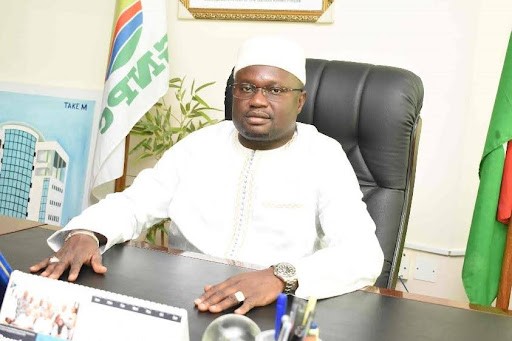By Kebba AF Touray
The Managing Director (MD) of Gambia National Petroleum Company (GNPC), Baboucar rNjie, has said that the GNPC operates as a trader and an oil marketing company in The Gambia.
MD Njie and the team appeared before the joint committee on Tuesday, 27 August 2024 to provide their testimonies to the committee in the parliamentary inquiry into the fuel saga.
The joint committee on Public Enterprise Committee 9PEC) and Finance and Public Accounts Committee (FPAC) have been tasked by the plenary during the second ordinary session of the assembly to hold inquiries into the issue of petroleum products that were landed in the Gambia in 2023.
The matter allegedly involved Apogee FZC, Creed Oil Energy Company Limited, and Ultimate Beigee Logistic Company, who are alleged to have been registered in the Gambia and have allegedly sold the said product to the OMCs on behalf of the Apogee FZC.
The said product is worth 36,953.614 metric tons, valued at US$30,000000, which is approximately Two Hundred and Ten Million Gambia Dalasi (D2,10,000,000).
There has been a reported potential tax evasion and breach of the Banking Act among other legislations and procedures in the country
On how GNPC sources its petroleum products, he said that GNPC serves both as a trader and an oil marketing company, noting this is why the depot would ordinarily have two accounts.
He said: “We have an OMC account and trader accounts. When we operate as a trader, the GNPC would identify potential suppliers, outside the country and have agreement to supply a particular consignment of petroleum products”.
He went on to state that when that happens, “we would notify Gam Petroleum that we are expecting a particular consignment in its metric tons. With that notification, comes with an application for ullage space, and based on the availability, Gam Petroleum would refer back to us and advise acceptance of the space”.
He said that once that is done, a tripartite communication channel would be created, between GNPC, Gam Petroleum, and the trader, and GNPC would furnish Gam Petroleum with all the documents they need.
Paramount among those documents he said, is the certificate of analysis and the certificate of origin, which enable Gam Petroleum to do their work.
He said that when that process is exhausted, they would notify their supplier, and the supplier would advise on the delivery date and Gam Petroleum would work towards that.
When the vessel arrives, it goes to a berth and the product would be tested to ascertain whatever is obtained on the certificate of quality and its accuracy.
“So, the test is usually carried out by an independent body, and once that is done, Gam Petroleum would receive the product and then they would give us the outturn report,” he said.
The outturn report, he said would specify that they are getting the bonus, then a certificate would be issued to GNPC for the consignment and that the product would be in their trader account, adding: “So, GNPC would start drawing from that product for our internal consumption, until the potential customer comes in.”
Another scenario, he explained, is wherein GNPC buys the product at the depot and the traders have always been bringing their products, and keeping it at the depot, where OMCs would now buy directly from the traders.
When asked to explain the off-stream sector, he told the committee that the sector would include all the activities that culminate in the extension of the crude oils
“The Gambia is placed as an oil block, so we have oil block and right now what we do is a sectorial approach for both the GNPC, the Petroleum Commission, and the Ministry of Energy and Petroleum. They are involved in the marketing of these oil blocks, so that we can have a company that will come in and partner with the government, through GNPC, for exploration and development initiatives,” he said.
He said that as the business of government in the oil and gas sector, it is also crucial that when companies come in for exploration purposes, the government’s interests are pursued by the GNPC, and they partner with whatever company that comes in, in a bid to explore and develop the country’s oil reserve.



















